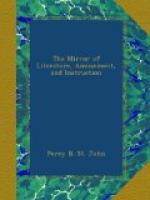Robin now turned the light foot of his country towards the wilds, through which, by Mr. Ireby’s report, Morrison was advancing. His mind was wholly engrossed by the sense of injury the treasured ideas of self-importance and self-opinion—of ideal birth and quality, had become more precious to him, (like the hoard to the miser,) because he could only enjoy them in secret. But insulted, abused, and beaten, he was no longer worthy, in his own opinion, of the name he bore, or the lineage which he belonged to—nothing was left to him—but revenge.
When Robin Oig left the door of the ale-house, seven or eight English miles at least lay betwixt him and Morrison, whose advance was limited by the sluggish pace of his cattle. And now the distant lowing of Morrison’s cattle is heard; and now he meets them—passes them, and stops their conductor.
“May good betide us,” said the South-lander—“Is this you, Robin M’Combich, or your wraith?”
“It is Robin Oig M’Combich,” answered the Highlander, “and it is not.—But never mind that, give me pack my dirk, Hugh Morrison, or there will be words petween us.”
“There it is for you then, since less wunna serve.”
“Cot speed you, Hughie, and send you good marcats. Ye winna meet with Robin Oig again either at tryste or fair.”
So saying, he shook hastily the hand of his acquaintance, and set out in the direction from which he had advanced.
Long ere the morning dawned, the catastrophe of our tale had taken place. It was two hours after the affray when Robin Oig returned to Heskett’s inn. There was Harry Wakefield, who amidst a grinning group of smockfrocks, hob-nailed shoes, and jolly English physiognomies, was trolling forth an old ditty, when he was interrupted by a high and stern voice, saying “Harry Waakfelt—if you be a man, stand up!”
“Harry Waakfelt,” repeated the same ominous summons, “stand up, if you be a man!”
“I will stand up with all my heart, Robin, my boy, but it shall be to shake hands with you, and drink down all unkindness.
“’Tis not thy fault, man, that, not having the luck to be an Englishman, thou canst not fight more than a school-girl.”
“I can fight,” answered Robin Oig, sternly, but calmly, “and you shall know it. You, Harry Waakfelt, showed me to-day how the Saxon churls fight—I show you now how the Highland Dunniewassal fights.”
He then plunged the dagger, which he suddenly displayed, into the broad breast of the English yeoman, with such fatal certainty and force, that the hilt made a hollow sound against the breast bone, and the double-edged point split the very heart of his victim. Harry Wakefield fell, and expired with a single groan.
Robin next offered the bloody poniard to the bailiff’s throat.
“It were very just to lay you beside him,” he said, “but the blood of a base pick-thank shall never mix on my father’s dirk, with that of a brave man.”




